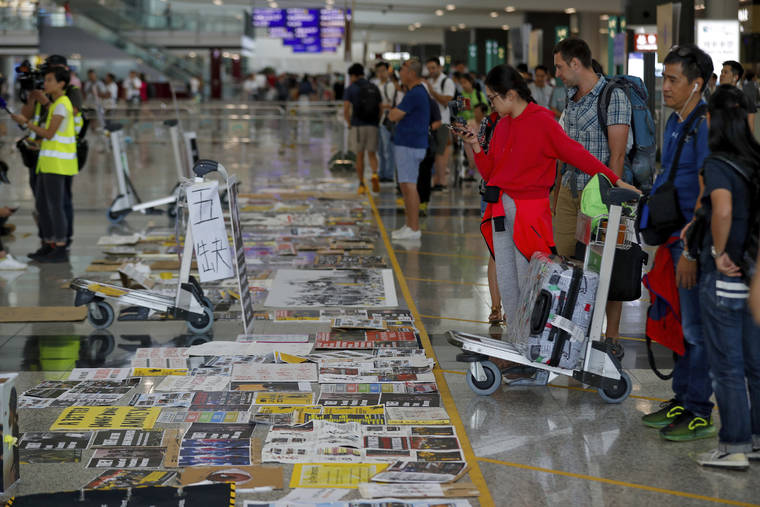HONG KONG — Flights resumed at Hong Kong’s airport Wednesday morning after two days of disruptions marked by outbursts of violence highlighting the hardening positions of pro-democracy protesters and the authorities in the Chinese city that’s a major international travel hub.
About three dozen protesters were camped in the airport’s arrivals area, a day after a mass demonstration and frenzied mob violence forced more than 100 flight cancelations. But check-in counters were open and flights appeared to be operating normally. Protesters spread pamphlets and posters across the floor in a section of the terminal but were not accosting travelers.
A statement from the airport’s management said it had obtained “an interim injunction to restrain persons from unlawfully and willfully obstructing or interfering” with airport operations. It said an area of the airport had been set aside for demonstrations, but no protests would be allowed outside the designated area.
The airport had closed check-in for remaining flights late Tuesday afternoon as protesters swarmed the terminal and blocked access to immigration for departing passengers. Tuesday’s cancelations were in addition to 200 flights backlogged from Monday.
Most of the protesters left after officers armed with pepper spray and swinging batons tried to enter the terminal, fighting with demonstrators who barricaded entrances with luggage carts. Riot police clashed briefly with the demonstrators, leading to several injuries and prompting at least one officer to draw a handgun on his assailants.
The burst of violence included protesters beating up at least two men they suspected of being undercover Chinese agents. Airport security appeared unable to control the crowd, and paramedics later took both men away. Police have acknowledged using “decoy” officers, and some protesters over the weekend were seen being arrested by men dressed like demonstrators — in black and wearing face masks.
Hu Xijin, editor-in-chief of the Global Times, identified one of the men as a journalist at the nationalistic Chinese tabloid.
“Fu Guohao, reporter of GT website is being seized by demonstrators at HK airport,” Hu wrote on his Twitter account. “I affirm this man being tied in this video is the reporter himself. He has no other task except for reporting.”
One protester used a U.S. flag to beat Fu as he lay on the floor. Other protesters and first aid workers attempted to stop some who tried to trample the man, while pro-democracy lawmaker Kwok Ka-ki crouched beside him and tried to calm the attackers. After a heated argument, protesters allowed ambulance workers to take the man away on a stretcher.
Hong Kong police said they arrested five people for unlawful assembly, assaulting police officers and possessing weapons. More than 700 protesters have been arrested in total since early June, mostly men in their 20s and 30s, but also including women, teenagers and septuagenarians.
The airport disruptions escalated a summer of demonstrations aimed at what many Hong Kong residents see as an increasing erosion of the freedoms they were promised in 1997 when Communist Party-ruled mainland China took over what had been a British colony.
The demonstrators are demanding Hong Kong leader Carrie Lam step down and scrap proposed legislation under which some suspects could be sent to mainland China, where critics say they could face torture and unfair or politically charged trials.
Lam has rejected calls for dialogue, saying Tuesday the protesters were threatening to push their home into an “abyss.”
Non-governmental organization Human Rights in China said Lam had exhibited incompetence and arrogance in refusing to meet with the protesters over their demands.
Lam has pursued Beijing’s hard line while ignoring “the rampant violence deployed by a police force clearly ill-trained to deal appropriately with crowd control,” the group’s Executive Director Sharon Hom said in an emailed statement. Lam has “shown herself not fit to lead Hong Kong out of this political crisis.”
The protests have hit at Hong Kong’s reputation as a well-regulated center for finance and travel hub. Playing on those concerns, Beijing has mobilized allies in the business community to condemn the protests, including key figures among overseas Chinese in the Philippines, Thailand and Singapore.
Some 21 countries and regions have issued travel safety alerts, saying the protests have become more violent and unpredictable.





